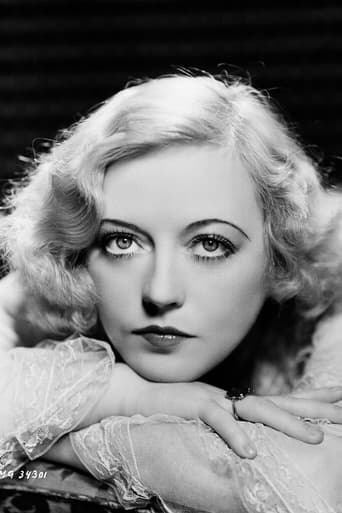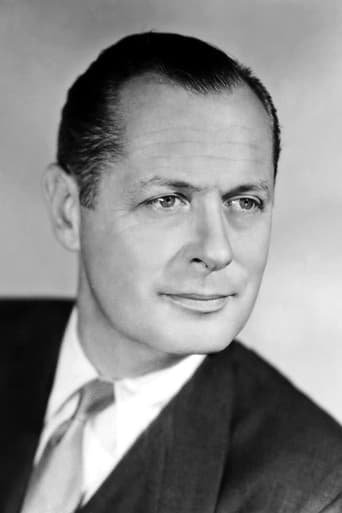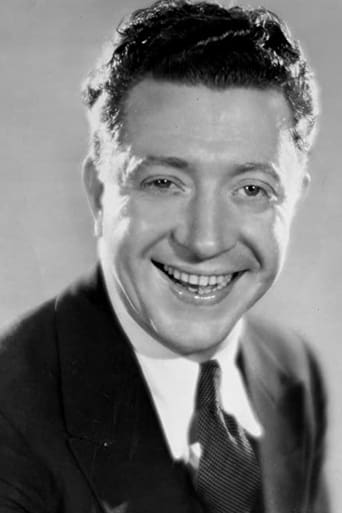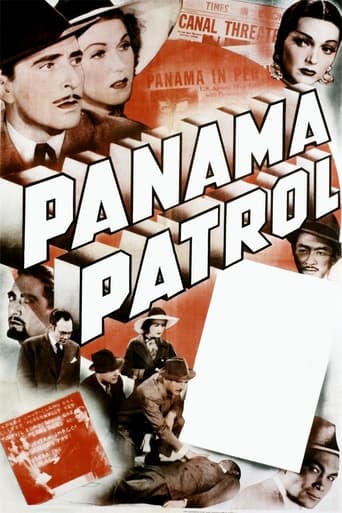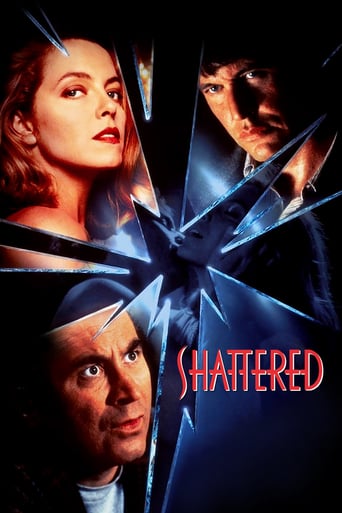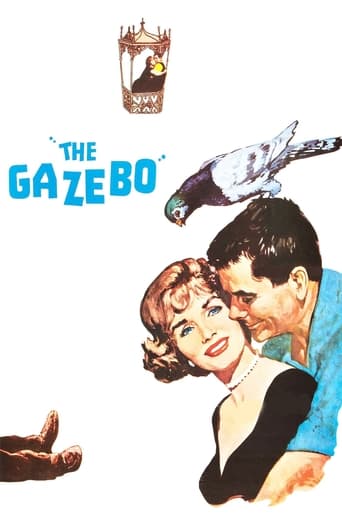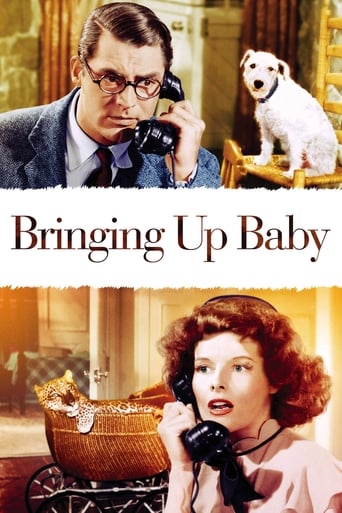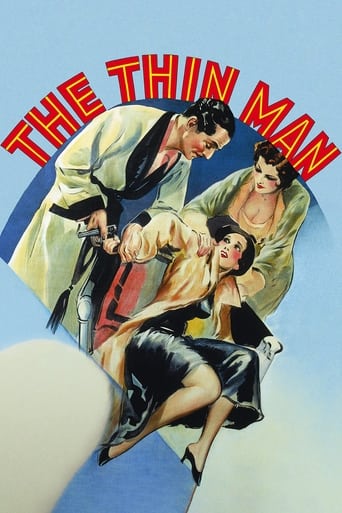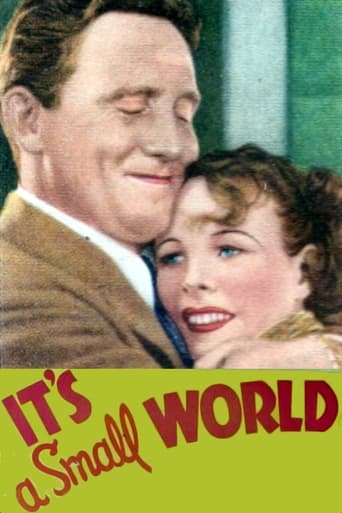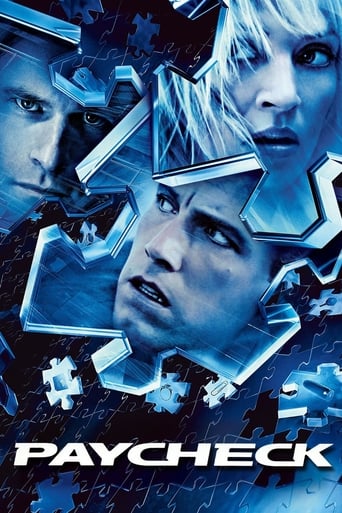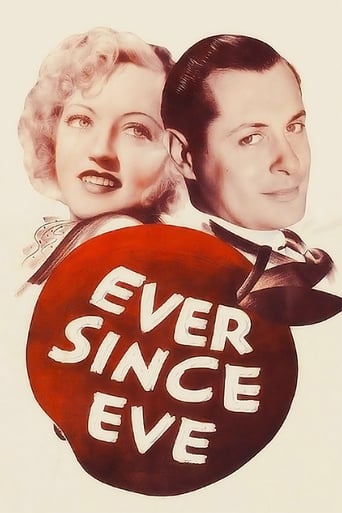
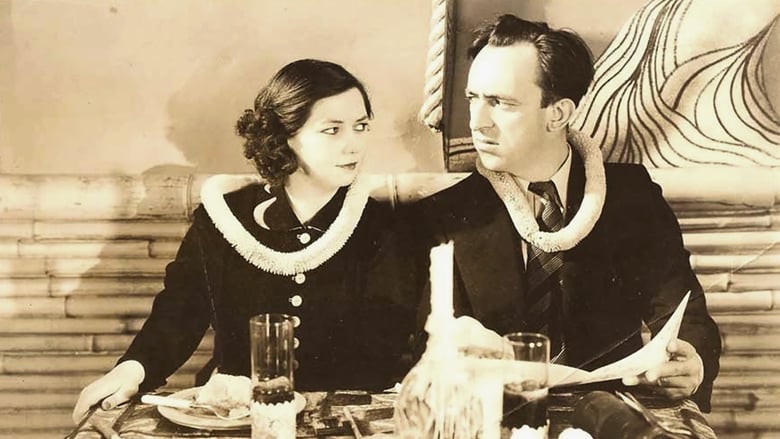
Ever Since Eve (1937)
Madge Winton (Marion Davies), a beautiful secretary, makes herself look homely in order to avoid advances by lecherous bosses. When her new employer, writer Freddy Matthews (Robert Montgomery), accidentally sees her without her disguise, she has to pretend to be her roommate Sadie.
Watch Trailer
Cast


Similar titles
Reviews
EVER SINCE EVE (Warner Brothers, 1937), directed by Lloyd Bacon, stars comedienne Marion Davies in what proved to be her final screen appearance. With her career dating back to the silent era of the 1920s, ranging from drama, historical costume epics and later occasional musicals during the sound era, many agree that Davies was at her best when it came to comedy, especially the available silent Hollywood story titled SHOW PEOPLE (MGM, 1928). Even in sentimental drama as PEG O'MY HEART (MGM, 1933), Davies could be quite appealing. Leaving her home base of MGM by 1934, she settled for Warner Brothers where she starred in four productions before EVER SINCE EVE made it her last before retirement. Whether this was intentional or not is uncertain, for that approaching the age of 40, it would be a matter of time before Davies might turn to character parts or mother roles. Though EVER SINCE EVE is not a Biblical tale of Adam and Eve, it's only a movie title with a song number bearing that title, but no character in the story named Eve. It's a story about a pretty secretary named Marge posing as a homely girl so not to have her male bosses doing more than dictating on company time.Set in San Francisco, California, the story opens by the building of the Peace and Purity League where five pound boo volumes of "The History of Peace" are thrown out the window landing on the sidewalk to a crowd of pedestrians below. The camera soon captures Marge Winton (Marion Davies) quitting the firm after Mr. Mason (Harry Hayden) "was giving dictations but was a little too fast." Her next place of employment for Henderson, Barton and Lowell Imports finds her going through the same routine with the company presidents, Henderson (William B. Davidson), Barton (Pierre Watkin) and Mr. Lowell (John T. Murray), all wanting her to work overtime and in private. At the Johnson Employment Agency, Marge learns of a publishing company hiring only homely women to keep the male workers on their jobs and not on their pretty secretaries. Turning herself into an ugly ducking, Marge takes the position under the male figure of a woman president, Abbie Belldon (Louise Fazenda), who assigns Marge as stenographer under Freddy Matthews (Robert Montgomery), an author whose book is due for completion by May 1st. Matthews delay in meeting the deadline is caused his jealous girlfriend, Camille Lancing (Marcia Ralston), who takes up much of his time playing around. After Marge quits, he soon realizes she's the most efficient stenographer he ever had. Wanting her back in his employ, he comes to her place of residence where he meets the pretty Marge, posing as her roommate, Sadie Day (Patsy Kelly), which stirs up confusion with Sadie's plumbing boyfriend, Jake Edgall (Allen Jenkins). Afraid of losing her job, Marge becomes Sadie, followed by a relationship of love. In order to get his book finished or else face a $30,000 lawsuit, "Sadie" leaves Freddy and heads for Monterey. Unable to forget "Sadie," though ignoring his deadline, Freddy leaves for the Monterey Tavern to find Marge, who stirs up further confusion trying to be two people at the same time without arousing suspicion.Among those in the cast featured are: Barton MacLane (Al McCoy, Jake's boss); Frank McHugh (Mike McGillicuddy, employee under Miss Bellkon using the name of "Mabel DeFlaven); Frederick Clark (Alonzo, Freddy's Butler); Charley Foy (The Bellboy); and Mary Treen (The Employment Clerk), among other. Brief song interludes include: "Shine On, Harvest Moon," "The Wreaths of Flowers," "Ever Since Eve" (by Jack Schroll and M.K. Jerome); and Spanish dance performed by uncredited couple. The pleasing title song is also underscored during title credits and story Overlooking the fact that there was an earlier film bearing the EVER SINCE EVE title for Fox Films (1934) starring George O'Brien and Mary Brian, the one thing about this EVER SINCE EVE should have been was being an exceptional comedy, but somehow became a misfire upon release. Though the casting and comedy lines are well cast and constructed, when released at the time here screwball comedies were on the rage, EVER SINCE EVE didn't seem to warm up to either movie going public or critics possibly because of Davies' unattractive presence of either looking like a comic strip character, or a pale comparison to silent screen actress Colleen Moore in horn-rim glasses and long bangs. Comedienne like Lucille Ball in later years could and would get away with becoming unglamorous types such on television, as this and accepted and adored with laughter by her viewers. It's a wonder how the public might have accepted other leading ladies as Jean Arthur, Carole Lombard or Jean Harlow in the same situation? The plot is formula material, which is no surprise here. Robert Montgomery (on loan from MGM) is quite acceptable as the author with who'd rather have his eyes on attractive women than finishing his novel; while Patsy Kelly, as usual, adds amusement getting a quota of laughs with her one-liners. Barton MacLane, usually a serious actor, is briefly shown as one to date Marge, only to run the opposite direction after seeing her new image.Never distributed to home video, EVER SINCE EVE does deserve a look, especially for it being Marion Davies' farewell performance, whenever it turns up on Turner Classic Movies cable channel. (**)
For a film that starts off so promising, "Ever Since Eve" ends up very disappointing. For the first third, it's quite funny, this story of office sexual harassment where the victim can't go to HR. She simply makes herself into a plain Jane to avoid amorous bosses to whom overtime doesn't include office work. Marian Davies (quite lovely, as Louella would always say!) does what Ginger Rogers did two years ago in "In Person", for different reasons, however. This is confusing for her rowdy roommate (Patsy Kelly) and her boyfriend (Allen Jenkins) and for her new boss, an author of movie stories (Robert Montgomery) who has a really obnoxious socialite fiancée (Marcia Ralston). So far, so good. Montgomery at first finds the plain version of Davies too demanding of him (because of his boss, Louise Fazenda), but when she quits because of accusations made by Ralston, he goes to her apartment where he meets the pretty version of Davies. Thus, he falls instantly in love, but she pretends to leave town so he'll finish his deadline. Montgomery follows her to the place she really didn't intend to go, so Davies must rush there, both as her pretty and plain versions. Confused??? This is where the film goes off the rack, having a sudden group of thieves interrupt, including one woman who looks exactly like Davies and is wearing the exact same costume.As I said, the first 2/3 are really entertaining, not in a "My Man Godfrey" classic sort of way, but still enjoyable. Everyone is doing their best to provide laughs in a ridiculous but still fun plot line. But once they get to the inn, it just gets too much. Poor Ralston, who resembles Merle Oberon, but doesn't get to be as ladylike here, suffers all sorts of indignities with her obnoxious character. Frank McHugh too is around as Montgomery's pal who escorts Ralston when her fiancée is not available. Today, this sort of plot line could never be filmed because of its obvious use of sexual harassment and the way that is handled in the workplace. But in the 30's, the "How to Succeed in Business" song "A Secretary is Not a Toy" hadn't been written yet and as any 30's movie viewer knows, a secretary made many a hard-working businessman very happy. This is one of those films to take with a grain of salt and enjoy mostly for its fine character performances and sometimes witty banter.
The cinematic swan song of Marion Davies is mostly run of the mill but contains some sparkling supporting performances and some funny gender- based situations. For one thing, the film makes the visual point, perhaps even stale for 1937, that female unattractiveness is connected to straight or severely styled hair, round-rimmed eyeglasses, lack of lipstick and bulky clothing – the look Davies adopts to get hired by Louise Fazenda's publishing house which prefers homely employees. Robert Montgomery, as the irresponsible fiction writer to whom Davies is assigned, has a washed-out quality here, as if he had grown weary of playing wealthy party boys. Davies, though too old and too laid back, is inoffensive. The oomph comes from the physically and vocally robust Fazenda and three other players: Frederic Clark as Montgomery's impeccably civil butler; Marcia Ralston (strikingly similar to Joan Crawford and Merle Oberon in looks) as Montgomery's fiery tempered girlfriend; finally, Patsy Kelly as Davies's roommate has a way with a good-natured wisecrack.
I give it a 5 because I liked Marion Davies but on the whole, this really was not a very good movie. For me, Patsy Kelly and Allen Jenkins were horribly annoying. I don't say that often about Patsy as I am a fan but this particular movie was not her best. I admit, though, that she was only annoying when she had to share the screen with Allen Jenkins. HE was the annoying one. I realize that I am filtering everything through modern sensibilities because it is impossible not to to a degree, but I could not see what she (Marion's character) fell in love with. Robert Montgomery's character was bland at best. The lead romantic characters didn't spend any time together...at least not enough to build a movie romance on. Love at first sight (so to speak)was not particularly well played out. Also, I think the premise could have been much more effectively played out. A pair of glasses and a wig does not render someone unrecognizable. Marion deserved so much better than this. Now, this is not the worst film I have ever seen but it is by far not a very good effort. It tried for screwball but didn't quite make it there. See it though, if only to be able to see Marion's last screen performance. She was highly underrated. Don't use this as an example of her best work.


